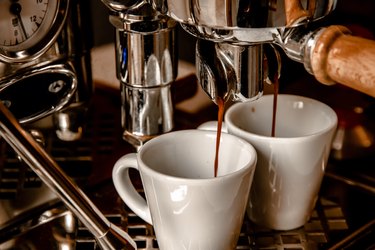
You just polished off a juicy hamburger and crispy fries on a well-deserved night out with friends and suddenly notice your heart rate is starting to climb. Unsure of what could be causing it, you may wonder if this is normal after eating or if you overdid it at dinner.
Eating a large meal can sometimes speed up your heart rate, especially if you end up overeating, according to Northwestern Medicine. Overeating causes the body to work harder to support the digestive system, and the amount of blood sent to your gut may result in an increased heart rate.
Video of the Day
Video of the Day
However, in addition to the quantity, the type of food you've eaten can also lead to an increased heart rate, says Shephal Doshi, MD, a cardiac electrophysiologist and director of cardiac electrophysiology and pacing at the Pacific Heart Institute in Santa Monica, California. "This may be related simply to some food allergies or foods that directly can affect your heart rate, such as caffeine or alcohol," he says.
Read more: What's Your RHR and Why Should You Care?
Possible Culprits
Caffeine is a chemical that stimulates your nervous system and can raise your blood pressure, according to the U.S. National Library of Medicine. Naturally occurring in plants such as coffee beans, tea leaves, kola nuts and cacao pods, caffeine boosts your energy and makes you feel more awake. However, too much caffeine can be associated with a rapid or abnormal heartbeat.
Those who drink coffee or other caffeinated drinks should ensure that they're consuming caffeine in moderation. According to the current Dietary Guidelines for Americans, up to 400 milligrams of caffeine each day shouldn't pose dangerous health effects. (That's roughly four to five cups a day, says the U.S. Food and Drug Administration.)
Energy drinks, which are typically packaged with claims that they'll improve alertness and physical performance, often contain large amounts of caffeine, which can be dangerous, according to the National Library of Medicine. The library notes that data supporting claims of better alertness and endurance are "limited" and insufficient when it comes to enhancing strength or power.
As for alcohol, it also may play a role. Though it's a central nervous system depressant, the National Library of Medicine says alcohol can actually raise your heart rate and blood pressure. And over time, if you drink heavily, it can increase your risk for heart disease.
For adults who drink alcohol, the Dietary Guidelines for Americans recommend limiting alcohol intake to one drink daily for those who aren't pregnant and two drinks daily for men. One alcoholic drink-equivalent is 14 grams or 0.6 fluid ounces of pure alcohol. That translates to 12 ounces of regular beer (5 percent alcohol), 5 fluid ounces of wine (12 percent alcohol) or 1.5 fluid ounces of 80-proof distilled spirits (40 percent alcohol).
Food Allergies May Be a Cause
Some people with food allergies may experience a severe reaction called anaphylaxis when they come into contact with the food they're allergic to, according to the Mayo Clinic. Common triggers of anaphylaxis include allergies to peanuts and tree nuts, fish, shellfish and milk.
Anaphylaxis is known to be associated with a weak and rapid pulse, along with other serious symptoms, including skin reactions, low blood pressure, tightening of the airways and a swollen tongue, lips or throat. Other symptoms include nausea, vomiting, diarrhea, dizziness or fainting.
Anaphylaxis is a medical emergency that can lead to coma or death if left untreated, the Mayo Clinic warns. If you're experiencing any of the symptoms of this reaction, be sure to administer your epinephrine autoinjector if you carry one and seek medical attention immediately.
What to Do
Although an elevated heart rate after eating isn't always abnormal, it could sometimes signal other health-related factors, Dr. Doshi says.
"In general, if someone is seeing a wide variation in heart rates during any particular activity that is unrelated to exercise, such as eating or ingesting certain foods, then they should seek medical evaluation," he says. If you're not sure whether what you're experiencing is normal or might be a sign of an underlying health condition, this will get you the answers you need.
Read more: What Is a Good Exercise Heart Rate?
- Mayo Clinic: “Anaphylaxis”
- U.S. National Library of Medicine: “Alcohol”
- U.S. National Library of Medicine: “Caffeine”
- Northwestern Medicine: “Overeating and Your Heart”
- Shephal Doshi, MD, cardiac electrophysiologist, director of cardiac electrophysiology and pacing, Pacific Heart Institute, Santa Monica, California
- U.S. Department of Agriculture/U.S. Department of Health and Human Services: “Dietary Guidelines for Americans, 2015-2020”
- U.S. Food and Drug Administration: "Spilling the Beans: How Much Caffeine is Too Much?"